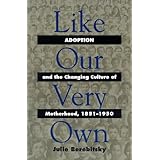
Average Reviews:

(More customer reviews)Are you looking to buy Like Our Very Own: Adoption and the Changing Culture of Motherhood, 1851-1950? Here is the right place to find the great deals. we can offer discounts of up to 90% on Like Our Very Own: Adoption and the Changing Culture of Motherhood, 1851-1950. Check out the link below:
>> Click Here to See Compare Prices and Get the Best Offers
Like Our Very Own: Adoption and the Changing Culture of Motherhood, 1851-1950 ReviewAnyone who is thinking about adopting a child or already has done so really should read this clearly written, engaging study of the history of adoption in the United States. Berebitsky's book is history that is relevant to our lives today and to the problems so many of us have confronted as we have explored how adoption relates to the so-called "real" biological family. To put it simply, the author shows that the issues and problems that adoptive parents face today are hardly new, but have a long and rich history. The best example of how the past illuminates the present is what Berebitsky discovers about the many unmarried women living before 1920 and who adopted children even though they either had no husband or were living with a female partner. Such women were not only accepted as mothers, they were encouraged to adopt such children. At a time when people believed that women's natures suited them to rear children, even women without a man in the house were sufficient as mothers. Beginning in the 1920s, though, single women fell out of favor as adoptive parents. That was when child "experts" and social critics began worrying that women without the tempering hand of a husband might "smother" their children with excessive affection or that mature unmarried women were really lesbians who would pass their deviance on to their children. What Berebitsky's work shows, then, is that there really is no such thing as a "real" or "natural" family that the rest of us must measure ourselves or our domestic arrangements against. In the recent past there were real alternatives to the "natural" family of married mother and father. Any adoptive parents today, as well as single women and gay or lesbian couples who are creating their own families through adoption will find plenty of evidence here to show that the unnatural or deviant ones are those who say there is only one kind of real family.Like Our Very Own: Adoption and the Changing Culture of Motherhood, 1851-1950 OverviewTalk about adoption has become increasingly politicized, as debates swirl around the morality and viability of various forms of adoption: interracial, international, "open," and those involving single parents or gay and lesbian couples. Paramount in many minds is the threat to the traditional (or mythical) nuclear family. But, as Julie Berebitsky shows, such concerns are fairly recent developments in the history of adoption.Berebitsky reveals that in the late nineteenth and early twentieth centuries the rules governing adoption were much less rigid and adoptive parents and families were considerably more diverse. In Like Our Very Own, she chronicles the experiences of adoptive parents and children during a century of great change, illuminating the prominent role adoption came to play in defining both motherhood and family in America.Drawing on case histories, letters from adoptive parents, congressional records, and fiction and popular magazines of the day, Berebitsky recovers the efforts of single mothers, African American parents, the elderly, and other marginalized citizens to obtain children of their own. She contends, however, that this diversity gradually diminished during the hundred years between the first adoption laws in 1851 and the postwar "baby boom" era. Adoption social theory and practice was gradually transformed into a highly homogenized model that tried to match children to parents by class and background and that ultimately favored conventional middle class American families.Changing attitudes about adoption, as Berebitsky shows, have also mirrored changing definitions of motherhood. At a time when womanhood and motherhood were socially synonymous, both birth mothers who gave up their children and adoptive mothers seeking a maternal role were viewed as transgressors of the natural order. This eventually changed, but only after proper training and outside expert approval replaced an assumed maternal instinct as the keystone of good mothering.A fascinating chapter in American social and cultural history, Like Our Very Own offers compelling evidence that adoption has always been an important factor in our evolving efforts to define the meaning and nature of both motherhood and family.Want to learn more information about Like Our Very Own: Adoption and the Changing Culture of Motherhood, 1851-1950?
>> Click Here to See All Customer Reviews & Ratings Now
0 comments:
Post a Comment